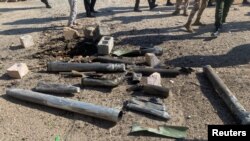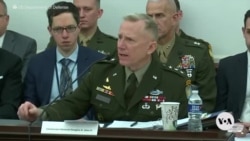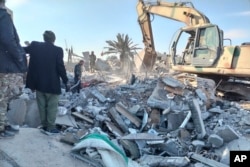United States airstrikes hit more than 85 targets Friday linked to Iran’s Revolutionary Guard and its proxies in Iraq and Syria, in retaliation for last Sunday's deadly drone attack on an American military base in Jordan.
The massive barrage targeted seven locations, including command and control headquarters, intelligence centers, storage sites for rockets, missiles, drones and ammunition, along with other facilities. President Joe Biden said the strikes demonstrate to “all those who might seek to do us harm” that "if you harm an American, we will respond.”
According to the U.S. Central Command, the retaliatory strikes reportedly killed nearly 40 people and injured about 23. The operation included long-range B-1 bombers flown from the U.S. that used more than 125 precision munitions, according to U.S. military officials.
A U.S. official said Saturday that an initial battle damage assessment showed the U.S. had struck each of its planned targets.
"We hit exactly what we meant to hit," said U.S. Army Lieutenant General Douglas Sims, who serves as the operations director for the Joint Chiefs of Staff. He said that the air assault took place over about 30 minutes, and that three of the sites struck were in Iraq and four were in Syria.
Rami Abdurrahman, who heads the Britain-based Syrian Observatory for Human Rights, said that 23 people were killed in the Syria strikes, all rank-and-file fighters, while Iraqi government spokesperson Bassim al-Awadi said in a statement Saturday that the strikes in Iraq near the Syrian border killed 16, including civilians, and that there was “significant damage” to homes and private properties.
Iraq, but not Iran, was informed before the strikes, according to U.S. officials.
“This is the start of our response," U.S. Defense Secretary Lloyd Austin said after the strikes. "We do not seek conflict in the Middle East or anywhere else, but the president and I will not tolerate attacks on American forces."
Iranian Foreign Ministry spokesperson Nasser Kanaani contended the airstrikes were "violations of the sovereignty and territorial integrity" of Syria and Iraq, and they represent "another adventurous and strategic mistake by the United States that will result only in increased tension and instability in the region."
Hussein al-Mosawi, spokesperson for Harakat al-Nujaba, one of the main Iranian-backed militias in Iraq, in an interview with The Associated Press in Baghdad condemned the U.S. strikes, although he struck a more conciliatory tone, saying that “we do not wish to escalate or widen regional tensions.”
Mike Johnson, speaker of the U.S. House of Representatives, was critical of the Biden administration’s weeklong delay in launching a retaliatory attack. “The public handwringing and excessive signaling undercuts our ability to put a decisive end to the barrage of attacks endured over the past few months.”
Senator Jack Reed, the Democratic chairman of the Senate Armed Services Committee, disagreed. “These strikes, in concert with wise diplomacy, send a clear signal that the United States will continue to take appropriate action to protect our personnel and our interests.”
Senator Roger Wicker, the panel’s senior Republican, said Biden’s move was too little, too late.
"These military strikes are welcome but come far too late for the three brave Americans who died and the nearly 50 wounded,” Wicker said. “Iran and its proxies have tried to kill American soldiers and sink our warships 165 times while the Biden administration congratulates itself for doing the bare minimum. Instead of giving the Ayatollah the bloody nose that he deserves, we continue to give him a slap on the wrist."
White House National Security Council spokesperson John Kirby said on a call Friday with journalists, "There will be additional response actions taken in coming days."
A U.S. military official, speaking to VOA on the condition of anonymity, said that while some Iranian operatives and militia members may have been killed in the attacks, that was not the goal of the strikes.
They were "not for personnel purposes but for a major disruption in logistics," the official said. "These [targets] are critical to their supply chain."
Kirby suggested additional U.S. strikes would have a similar goal.
Last Sunday's attack on Tower 22, a base in Jordan, killed three U.S. soldiers and injured more than 40 others. There has been no U.S. communication with Iran since that attack, Kirby said.
VOA White House Bureau Chief Patsy Widakuswara contributed to this report from Dover Air Force Base in Delaware. National Security Correspondent Jeff Seldin also contributed.








